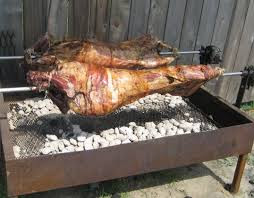
Easter being one of the most important holidays in Greece, we highly suggest to Greece holiday lovers to live this experience at least once. Specially when it falls later in Spring and you have more chances of enjoying the sea as well. Easter is considered to mark the passing of winter to spring. but this year Orthodox Easter is at the end of April beginning of May. In Greece, Easter is celebrated with an entire week of festivities with Good Friday, Easter Sunday, and Easter Monday being celebrated as public holidays.
Good Friday is considered to be a sacred day in Greece. The day starts out with local young girls and women decorating a replica (or “epitaph”) of Christ’s funeral bier with flowers. This is then marched through the streets of the village following an evening mass entitled “The Epitaph Mass.”
Easter Saturday is known as the The Resurrection or “Anastasis”. Preparations for the jovial dinner begin early in the morning with the cooking of the maghiritsa- a type of soup. The faithful begin to gather at churches and squares of the cities and villages before 11 p.m., carrying large white candles. Before midnight, the lights of the churches are put out in symbolism of the darkness that Christ had to endure as he passed through the underworld.
At midnight, a priest appears holding a lighted candle taper reciting the phrase “Avto to Fos”, which means “This is the light.” His candle, dubbed “the Holy candle”, is used to light several of the onlookers’ candles, which in turn then light their neighbour’s candles.

 This
continues until the entire square is lit with flickering candle light.
The lighting of the candles is said to be the most significant moment of
the entire year.
This
continues until the entire square is lit with flickering candle light.
The lighting of the candles is said to be the most significant moment of
the entire year.The resurrection is proclaimed at exactly midnight, and is celebrated with drums, fireworks, and church bells. Fireworks light up the sky in a majestic display.
The crowd offers the salutation
“Christós Anésti” (Christ has risen) to each other, which is responded to with the phrase “Alithós Anésti” (He has truly risen). They then dissipate; returning to their homes to the previously laid festive tables and break their fast with the traditional soup, maghiritsa. Before entering their homes, they make the symbol of a cross in the air with the smoke of the candle above the door. Devout followers are said to light an oil candle inside the home beside their icon-candle and keep this light burning throughout the year. It is said that if you can make it home without your candle going out, you will have a good year.
After the traditional dinner, the family and friends that gathered for dinner will crack red eggs. The game symbolizes resurrection and new life. Easter eggs are dyed red to exemplify the blood of the Christ. The hard shell of the egg is said to replicate the sealed tomb of Christ. Cracking the egg illustrates the resurrection. The rules of the game, called tsougrisma, are as follows:
Two players select a red egg. Each holds their egg and one taps the end of the other’s egg with theirs lightly. The goal is to crack the other’s egg without being forceful. Once an egg is cracked, the winner uses the same end of their red egg to crack the other end of their opponent’s egg. The winner is said to have good luck all year long.
The atmosphere on Easter Saturday is one of joy- family and friends gather for a momentous event that turns into a festive dinner party that often times will last long into the night.
Despite being up throughout the evening for the jubilant Resurrection feast, everyone is up early the next morning to prepare for the Easter Sunday dinner. The most celebrated of the Holy Week, Easter Sunday is a feast of lamb served in honour of the lamb of God. The lamb is usually roasted on a spit outside, and the entire day is celebrated with food, wine, music, friends, and lots of dancing.
Religious customs throughout the Easter celebrations have remained unchanged over centuries, being passed from generation to generation. Easter brings together several aspects of cultural influences of the nation for a beautiful week of celebration and commemoration of the religious and political histories of Grecian culture. Visitors to Greece during this time of year will bear witness to a sacred and magnificent time celebrating the resurrection of the body of Christ, as well as the symbolic end of winter and beginning of spring. Hints of Venetian and pagan influences combine with Orthodox Christianity and Roman Catholicism to bring you a truly touching experience. Grecian Easter carries not only a deeply rooted religious facet, but also a magical quality of the first signs of spring.
Traditional dances in the heart of the village
https://www.youtube.com/watch?v=IcB_F7kjOj4
and on Sunday if you want to live the real "GLENDI" (celebration) you can go to the little harbor. highly suggest to reserve a table in advance
https://www.youtube.com/watch?v=MLYao-Vuuqo
for more info on Easter on Paros you might want to visit the following pages
https://www.facebook.com/video.php?v=338063743071640
https://www.facebook.com/video.php?v=271129216431760
http://www.huffingtonpost.com/michael-schuermann/a-unique-easter-tradition_b_5182131.html
http://www.grreporter.info/en/easter_island_paros_exciting_atmosphere_against_background_aegean_sea/9187
For reservation contact me by email at
secretgardenparos@yahoo.gr








